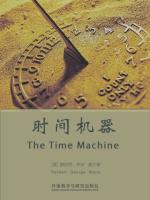时间机器读后感
宋文超
"The Time Machine": A Philosophical Journey Through the Future
"The Time Machine" by H.G. Wells is a masterpiece of science
fiction, first published in 1895. With its unique concept of time
travel, profound thematic exploration, and captivating storyline, this
work stands as a classic in the genre. Through this book, Wells not only
showcases humanity's limitless imagination of the unknown future, but
also delves deeply into the enduring themes of technology, society,
humanity, and fate. The protagonist, a brilliant scientist, embarks on a
journey through the future using his invented time machine. He witnesses
the tremendous transformations of human society, from highly advanced
civilizations to ultimate decline, and from the brilliance of humanity
to its darkest depths. This journey is not only an exploration of the
future, but also a profound reflection on humanity, society, and
technology. Firstly, Wells utilizes the science fiction element of time
travel to cleverly explore the relationship between technology and human
destiny. Undeniably, technological advancements have brought immense
convenience and progress to humanity, but they also pose potential
threats and disasters. In "The Time Machine," the future world
collapses and humanity perishes due to excessive reliance on technology.
This scenario serves as a warning to us to be cautious about technology
while pursuing its development. Secondly, Wells portrays various forms
of future society, exploring the diversity and complexity of human
nature. In the future world, human society undergoes significant
changes, ranging from highly developed civilizations to ones plunged
into darkness and chaos. These different social forms reflect different
aspects of human nature, encompassing both goodness and progress, as
well as greed and decay. Through this portrayal, Wells allows us to gain
a deeper understanding of the complexity and diversity of human nature.
Lastly, Wells explores the relationship between fate and choice through
the protagonist's adventures. In his beliefs and pursuits. His choices
not only impact his own future but also the fate of society. This
scenario prompts us to reflect on how we should make choices when faced
with difficulties and challenges, and how we should grasp our own
destiny. In conclusion, "The Time Machine" is a work of
science fiction filled with wisdom and insight. It not only immerses us
in the charm and imagination of science fiction, but also compels us to
contemplate the enduring themes of technology, society, humanity, and
fate. This book is not just a science fiction novel; it is a
philosophical work about the destiny and future of humanity.




 京公网安备 11010802032529号
京公网安备 11010802032529号